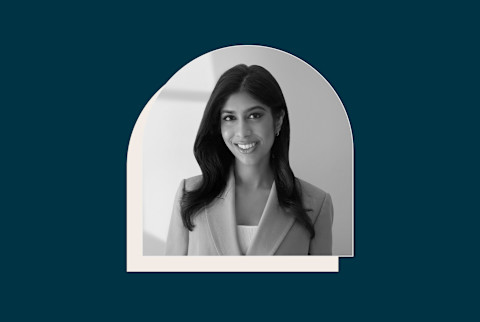Tune In: Expert Tips On How To Care For Mature Hair & Reverse Hair Loss

When we age, so does our hair. This happens in ways big and small, obvious and not. From graying and decreased density at the temples to shedding in the shower. Within the beauty space, we talk at length about how to care for mature skin but less so about how to care for aging hair.
So on this week's Clean Beauty School episode, I had on board-certified dermatologist Neera Nathan, M.D., a dermatologist and researcher at Massachusetts General Hospital and Harvard Medical School faculty member. In the episode, we talked about hair loss, nutrition's role in hair health, and why we see changes with age.
"When we age, our whole body ages. What happens is our cells just get tired and stop working as well as they used to. The hair follicle is no different," she says. "It's a collection of cells, and after a while, they start to deplete. Eventually, our hair follicles just aren't as able to grow hair as well, just as our skin isn't quite as able to regenerate collagen the way it did when it was younger."
So at this point, you're likely wondering what can be done about it, no? Well, tune into the episode for all her insights, but in the meantime—here are my three favorite takeaways.
Skip the crash diet—load up on protein
Nutrition plays a vital role in overall health. And while the nutrition and hair health connection can sometimes be misunderstood, Nathan says eating a balanced, robust diet is one of the key ways you can support hair health long term.
"We know in medicine from observation of people who have inherited disorders of vitamin metabolism or severe malnutrition, that hair growth is absolutely dependent on basic nutrients and overall internal health. No questions there," she says. "So crash diets, very restrictive diets, or diets completely devoid of protein can cause hair loss."
She goes on to explain why: "When your body goes into panic mode and tries to conserve resources, your hair will be among the first to suffer because it's not an essential function, so your resources are gonna be routed elsewhere."
The solution is basic but time-tested: Eat a robust, varied diet full of nutrients.
She notes protein is especially important. "Make sure you're getting enough protein because protein is needed to make hair. Our hair is primarily keratin, which is protein. It is that simple," she says. "And most healthy women should aim for about 40 to 60 grams of protein per day, and I do think that's a lot more than many of us are getting." Other experts suggest aiming for upward of 100 grams per day. It's safe to say we could all be more mindful of eating enough protein.
Address low-grade, chronic stress
Stress-related hair loss is not a new concept. In fact, interest in the topic piqued during the pandemic. This was largely due to the physical stress brought on from COVID itself, as well as the heightened anxiety around loss and lockdown. These were major stressors that kicked off what's called telogen effluvium.
But it's not just big stressors (like illness, loss, and so on) that can affect hair growth—new research indicates that low-level, chronic stress has the same potential.
"There's some growing evidence that low levels of chronic stress, so we're talking day-to-day stress, can actually elevate our stress hormones like cortisol, which can in turn gradually shorten the hair growth cycle and ultimately turn off our hair follicles," says Nathan.
So high-pressure jobs, burnout, and anxiety-inducing personal circumstances can all lead to increased hair loss over time—thanks to their cumulative effect on our cortisol levels.
Just another reminder that it's critical to find stress management that you can practice regularly. Nathan recommends meditation (her personal modality), time outside, exercise, and connection. "Eat well, prioritize sleep, take walks, and foster really close friendships. Those are the keys to health, happiness, and beauty," she says.
Look for these antioxidant-rich topical treatments
While lots of the work is internal—how we care for our hair and scalp externally will be one of the most important variables in how the hair ages. First things first, Nathan notes, reduce your use of heat styling and chemical processing and avoid ingredients that are known irritants for the scalp and hair follicle (like silicones or fragrance).
If you want to actively encourage growth and thickness, opt for scalp treatments or serums: "If someone is looking for a natural topical treatment for hair loss, I think there's really exciting data about topical caffeine and turmeric," she says.
Caffeine has been shown to stimulate hair growth1 and also counteract the potentially damaging effects of hormones and stress on the hair follicle And turmeric, "is another ingredient to look for, especially if you're prone to a particularly dry or irritated scalp. This can help get your scalp in really good shape for growing healthy hair. And there's also some early data that turmeric may help block DHT2, a hormone associated with hair thinning," she says.
For more hair health advice, tune in:
